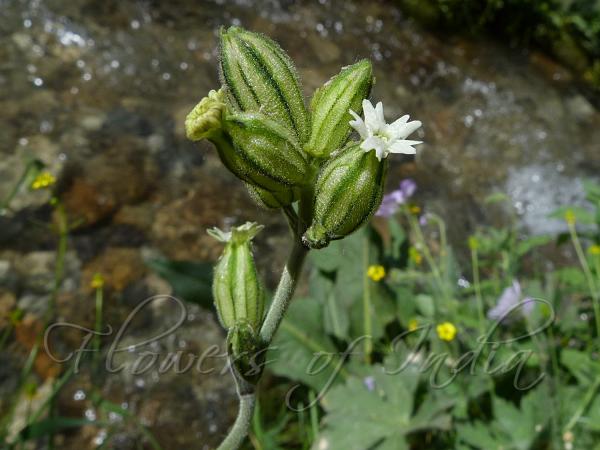|
| Clustered Campion |
|

|

| File size | 252951 |
| Original date | 6/28/12 3:31 PM |
| Resolution | 1500 x 1125 |
| Flash | Flash did not fire, auto |
| Focal length | 4.5mm |
| Exposure time | 1/400s |
| Aperture | 5.6 |
| Focus Distance | |
| Metering Mode | Multi-segment |
| Camera make | Panasonic |
| Camera model | DMC-FZ40 |
| Sensor type | OneChipColorArea |
|
|
|
|
Photo: |
Botanical name: Silene caespitella Family: Caryophyllaceae (Carnation family)
Synonyms: Silene maheshwarii, Melandrium neocaespitosum, Melandrium xainzaense
Synonyms: Silene maheshwarii, Melandrium neocaespitosum, Melandrium xainzaense
Clustered Campion is a perennial herb 13-40 cm
tall. Stems are clustered, erect, green, velvet-hairy throughout.
Basal and lower stem leaves are green on both surfaces, linear, 4-7 cm
long, 2-5 mm wide, margin hairy, midvein prominent, surface hairy only
at veins or hairless, base narrow, tip pointed. Upper leaves are 3 or 4
pairs, stalkless, linear, gradually smaller upward. Flowers are up to
20, in an irregular cluster with long- and shortly stalked,
3-5-flowered clusters, sharply nodding, becoming erect in maturity.
Flower-stalks are short. Sepal cup is narrowly cylindric-bell-shaped,
soon becoming broader as capsule swells, 5-7 x 2.5-3 mm, rounded at
base, open at tip, weakly hairy, veins dark green to blackish red,
teeth triangular, about 2.5 mm, margin membranous, hairy, tip pointed.
Petals protrude out 1-2 mm beyond sepals, greenish or white, shallowly
two-lobed. Stamens and styles remain inside. Capsule is spherical,
about 8 mm, slightly longer than sepal cup. Seeds are gray,
spherical-kidney-shaped, about 0.8 mm.
This species is closely related to Silene nepalensis, from which
it differs in its linear leaves and smaller flowers. Clustered Campion
is found in the Himalayas, from Kashmir, Ladakh to Bhutan, SE Tibet, SW
China, at altitudes of 2500-5100 m. Flowering: June-July.
Identification credit: Bernhard Dickore
| Photographed in Nubra Valley, Ladakh. |